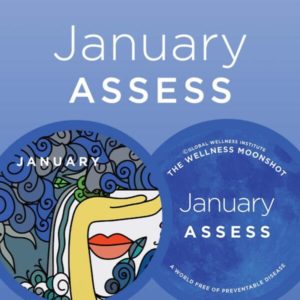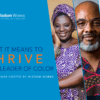Be Well Lead Well® is committed to advancing the consciousness and capabilities for more inclusive, well, and wiser leadership. In support of these efforts, Be Well Lead Well® Director and Wisdom Works CEO, Renee Moorefield curates monthly content and resources for The Wellness Moonshot: A World Free of Preventable Disease, an initiative of the Global Wellness Institute. The goal: to bring together global wellness enthusiasts, from scientists and educators to health experts and business leaders, to eradicate preventable disease worldwide.
Each month, Renee explores wellbeing leadership through the themes of The Wellness Moonshot Calendar. Below is an excerpt from January’s theme, ASSESS, with steps you can take to get clear on the health and wellbeing of your team and organization.
January 2022 | ASSESS

Welcome to a healthy and happy 2022—and the year we anticipate remarkable growth for The Wellness Moonshot: A World Free of Preventable Disease! We’re putting our moonshot thinking into action, and as a wellness leader, we invite you to join us.
Our aspiration? DOUBLE THE REACH of this initiative! This means by January 2023, we want The Wellness Moonshot: A World Free of Preventable Disease to touch over 9,000 organizations and 300 million people globally. We’ve chosen an audacious goal (yes, we are inspired by bold!), yet in truth, this isn’t about attaining the numbers. The real impetus is for this initiative, fueled by all of us, is to be a positive force for spreading the mindset and meaningful opportunities for wellness around the world.
Yet, We Have A Long Way to Go
If our commitment to wellness means anything, it means advancing #WellnessForAll—and when we honestly examine the state of the world, we see many systemic health and wellness inequities intensified by the pandemic. Consider these disturbing, yet largely preventable, facts shared by the World Economic Forum:
- We are not adequately caring for our children. Every day, 16,000 children from our poorest households worldwide die before their fifth birthday.
- We are not adequately caring for our mothers. Women from Afghanistan have a 1 in 11 risk of maternal death (death while pregnant or within 42 days of the end of pregnancy), while for women in Ireland, it is 1 in 17,800.
- We are not adequately caring for people who are less resourced. The high costs of non-communicable diseases, such as diabetes and heart disease, are pushing 100 million people into poverty each year.
- We are not adequately caring for our neighbors. In London, 1 year of life expectancy is lost when traveling east from Westminster due to significant health disparities between each tube stop.
- We are not adequately caring for our longevity. A child born in Japan can expect to live 84 years, while a child in Sierra Leone can expect to die by 50.
Wellness is no longer a lifestyle to promote health and prevent disease alone; the pandemic has made it our collective priority. We create healthier work environments and societies that benefit us all when we include everyone in it.
“The inequity in COVID-19 risks and COVID-19 deaths has sparked a widespread awakening to the inequities of preventive health and the external determinants of health. Public health on every level needs greater investment, and it must extend beyond vaccinations and anti-smoking campaigns to a more holistic and equitable promotion of healthy lifestyle habits and healthy living environments.”—The Global Wellness Economy: Looking Beyond COVID. A 2021 Report by the Global Wellness Institute
Three Steps You Can Take Now
A key role we play as wellness leaders is to assess the health and wellbeing of the people we serve, notice what’s working, and get honest about where inequities and dysfunction exist. How can you begin?
- Start by assessing yourself. Ask: To what extent do I prioritize wellness personally and amplify it in the lives of others? To answer this question, take a non-judgmental yet candid inventory of your own life. Get feedback from your loved ones or team members. Or complete our science-backed assessment, Be Well Lead Well Pulse® to examine how various psychometrics of wellbeing and stress resilience are playing out in how you live and lead. Remember: Your effectiveness as a wellness leader rests on your foundation of wellbeing.
- Broaden your focus to family and community. Substantial evidence shows family wellbeing highly linked to the wellbeing of individuals and the wider community. Draw questions and guidance from the Child and Family Wellbeing Assessment Tool, developed for wellness practitioners by the Government of Tasmania. This excellent educational resource can help you cultivate family wellbeing wherever you live with thoughtfulness, care, and compassion.
- Examine your work culture. To embrace #WellnessForAll, your organization must emphasize diversity, inclusion, equity, and accessibility in its strategies for thriving at work. Assess how that’s going by asking simple yet challenging questions to a cross section of employees: Who is heard, valued, recognized, and supported here? And who isn’t? Plus, engage in a focused study with an expert research partner to get evidence-based findings about your work culture. People who identify as LGBTQIA+, BIPOC, and female, as well as people with disabilities are often among the most underrepresented in decisions at work. And you lose a great deal of creativity, talent, profitability, and institutional wisdom when you let people fall through the cracks.





